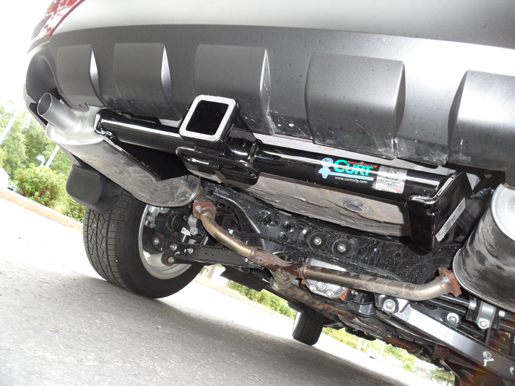
When it comes to towing or hauling campers and boats, properly installed trailer hitches are vital for a safe and hassle-free experience. Call for a FREE ESTIMATE or stop by one of our Colorado area stores. Whether you’re planning a weekend camping trip or heading to the lake for a boating adventure, having the right trailer hitch ensures that your precious cargo is securely attached to your vehicle. In this article, we will discuss the importance of trailer hitch installation, the different types of hitches available, and the benefits of professional installation for your towing needs.
Why Trailer Hitch Installation Matters
Proper installation of a trailer hitch is crucial for several reasons:
Safety: A correctly installed hitch ensures that your camper or boat remains securely attached to your vehicle, minimizing the risk of accidents or detachment during transit. It provides stability and control, allowing you to maneuver your vehicle confidently.
Weight Distribution: A trailer hitch, when installed correctly, helps distribute the weight of the load evenly between your vehicle and the trailer. This prevents excessive strain on your vehicle’s suspension, brakes, and tires, reducing the chances of mechanical failures and ensuring a smooth ride.
Legal Compliance: Many regions have specific regulations regarding trailer hitch installation and towing capacities. By adhering to these regulations and installing your hitch properly, you avoid potential legal issues and penalties.
Types of Trailer Hitches
Receiver Hitch: The most common type of trailer hitch, the receiver hitch, consists of a square or rectangular receiver tube that attaches to your vehicle’s frame. It offers various weight capacities and can accommodate different types of accessories, such as ball mounts or bike racks.
Gooseneck Hitch: Gooseneck hitches are ideal for towing heavy loads, such as large campers or livestock trailers. They connect to the bed of your truck, providing increased stability and weight distribution.
Fifth-Wheel Hitch: Fifth-wheel hitches are commonly used for towing large campers and recreational vehicles (RVs). They are mounted in the bed of a pickup truck and provide superior maneuverability and towing capacity.
Benefits of Professional Installation
While some experienced individuals may attempt to install a trailer hitch themselves, there are distinct advantages to opting for professional installation:
Expertise and Experience: Professional installers possess the necessary knowledge and experience to select the right hitch for your specific towing needs. They can assess your vehicle’s specifications, recommend the appropriate hitch type, and ensure a secure installation.
Proper Alignment: Professional installers have the expertise to align the trailer hitch correctly with your vehicle’s frame. This alignment is crucial for optimal weight distribution and towing performance.
Wiring and Electrical Connections: In addition to hitch installation, professionals can handle the wiring and electrical connections required for your trailer’s lights and brakes. This ensures that all safety features are functioning correctly and in compliance with regulations.
Time and Convenience: By entrusting the installation to professionals, you save valuable time and effort. They have the necessary tools and equipment to complete the job efficiently, allowing you to focus on other aspects of your trip preparation.
Choosing the Right Trailer Hitch
When selecting a trailer hitch, consider the following factors:
Towing Capacity: Determine the weight of the trailer or camper you plan to tow and choose a hitch with a corresponding towing capacity. It is essential to select a hitch that can handle the weight of your load safely.
Vehicle Compatibility: Ensure that the trailer hitch you choose is compatible with your vehicle’s make and model. Consider the frame structure, bumper configuration, and any limitations specified by the manufacturer.
Professional Advice: If you’re unsure about which trailer hitch to select, consult with professionals. They can assess your towing needs, provide expert recommendations, and guide you toward the most suitable hitch for your vehicle.
Investing in a properly installed trailer hitch is a crucial step in ensuring the safe and secure towing or hauling of campers and boats. It provides stability, weight distribution, and peace of mind during your outdoor adventures. While DIY installation may be tempting, the professional installation offers expertise, proper alignment, and adherence to legal regulations. By choosing the right trailer hitch and opting for professional installation, you set the stage for a successful and enjoyable journey.
FAQs
Can I install a trailer hitch myself?
While it is possible to install a trailer hitch yourself, professional installation is recommended for optimal safety and performance.
How long does professional installation take?
The duration of professional installation varies depending on the vehicle and the type of hitch being installed. Typically, it can take a few hours to complete.
Can I use a trailer hitch for towing different trailers?
Trailer hitches come in different types and weight capacities. It’s important to select a hitch that matches the specific requirements of each trailer you plan to tow.
Are trailer hitches compatible with all vehicle models?
Trailer hitches are designed to be compatible with specific vehicle models. Consult with professionals or refer to the manufacturer’s guidelines to ensure compatibility.
How often should I inspect my trailer hitch?
Regular inspections are recommended to ensure the hitch remains in good condition. Inspect it before every trip and address any signs of wear, damage, or corrosion promptly.
 When it comes to towing or hauling campers and boats, properly installed trailer hitches are vital for a safe and hassle-free experience. Call for a FREE ESTIMATE or stop by one of our Colorado area stores. Whether you’re planning a weekend camping trip or heading to the lake for a boating adventure, having the right trailer hitch ensures that your precious cargo is securely attached to your vehicle. In this article, we will discuss the importance of trailer hitch installation, the different types of hitches available, and the benefits of professional installation for your towing needs.
When it comes to towing or hauling campers and boats, properly installed trailer hitches are vital for a safe and hassle-free experience. Call for a FREE ESTIMATE or stop by one of our Colorado area stores. Whether you’re planning a weekend camping trip or heading to the lake for a boating adventure, having the right trailer hitch ensures that your precious cargo is securely attached to your vehicle. In this article, we will discuss the importance of trailer hitch installation, the different types of hitches available, and the benefits of professional installation for your towing needs.
